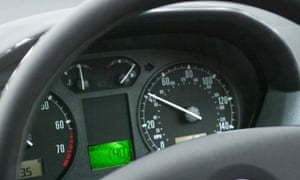Firms against plans to benchmark new technology that adjusts speed to local limit

The new ‘intelligent speed assistance’ technology uses traffic sign recognition and GPS satellite signals to automatically reduce vehicle speeds.
Photograph: Don McPhee for the Guardian
Car industry lobbyists are pushing the EU to weaken safety technology proposals, even though their own research predicts the move would cause more than 1,000 extra road deaths each year.
The European Automobile Manufacturers Association (Acea) is fiercely opposing an EU attempt to benchmark a technology that automatically reduces car speeds to local limits. The group favours one that just sends speeding drivers a dashboard warning.
Letters seen by the Guardian show that Acea last month had to remove claims from its website that speed limit information (SLI) technology was “an effective alternative” to intelligent speed assistance (ISA) “combined with better enforcement and driver training.” This came after TRL, the expert consultants to whom it had jointly attributed the claim, said it was “not true” and “damaging [to its] reputation”.
Richard Cuerder, TRL’s director, said in a message to the European transport safety council (ETSC): “If every [vehicle] in the EU28 today was fitted with SLI instead of ISA, approximately 1,300 more people would be killed on our roads every year. SLI is not an effective alternative to ISA.”
Cuerder confirmed to the Guardian that Acea had been made aware of the figures, and TRL’s objections to the claims about SLI.
Despite this, Acea has continued to use the “effective alternative” phrase in its lobby material, and the wording has been inserted into nine amendments to the EU package now being proposed by three MEPs.
Antonio Avenoso, the ETSC director, told the Guardian: “These new vehicle safety standards will have a hugely important impact on reducing deaths on European roads. So it’s critical that the political discussion is not frustrated by misleading information.
“That a handful of MEPs are trying to copy-paste this into the legislation itself is very worrying. The price would be paid in lives lost that otherwise would not have been.”
None of the three rightwing MEPs proposing the amendments – Jacqueline Foster, Andor Deli or Massimiliano Salini – immediately responded to requests for comment.
Acea declined to discuss its interactions with MEPs or its reasons for repeating the disputed claims. Acea says on its website: “ISA technology holds promise for the future.” However, a spokesperson said it “still shows too many false warnings due to incorrect road signs and outdated speed limit information – something that most consumers will not accept.”
This is contested by Mobileye, a leading safety tech supplier, which says ISA systems have an accuracy rate of 90-95% and rising in the EU.
ISA, which is used by some Ford cars, employs traffic sign recognition systems and GPS satellite to adjust car speeds. It turns itself off in inclement conditions and can be manually over-ridden.
ISA is one of 16 safety measures – including automated emergency braking and motorway lane assistance – in the EU general safety regulation aimed at cutting road deaths by 25,000 – one year’s death toll at present – over a 15-year period.